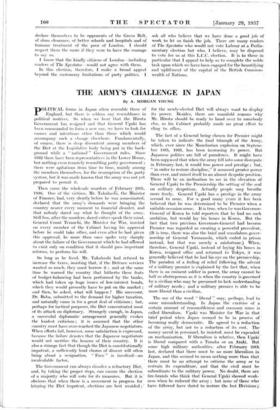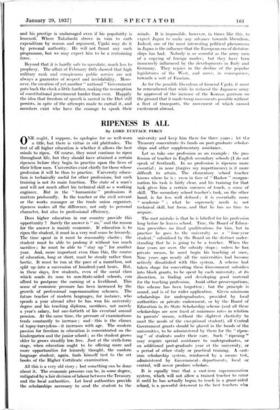THE ARMY'S CHALLENGE IN JAPAN
By A. MORGAN YOUNG Then came the wholesale murders of February 26th, 1936. One of the victims, Mr. Takahashi, the Minister of Finance, had, very shortly before he was assassinated, declared that the army's demands were bringing the country nearer every moment to financial disaster, and that nobody dared say what he thought of the army. Still less, after the murders, dared critics speak their mind. General Count Terauchi, the Minister for War, insisted on every member of the Cabinet having his approval before he could take office, and even after he had given this approval, he more than once spoke very sharply about the failure of the Government which he had altowed to exist only on condition that it should pass important reforms, to perform his will.
So long as he lived, Mr. Takahashi had refused to increase the taxes, insisting that, if the Defence services wanted so much, they must borrow it ; and at the sanie time he warned the country that hitherto these feats of budget-balancing had been performed by the banks, which had taken up huge issues of low-interest bonds, which they would presently have to put on the market ; and then, he asked, what will happen ? His successor, Dr. Baba, submitted to the demand for higher taxation, and naturally came in for a great deal of criticism ; but, perhaps for tactical purposes, the Diet concentrated most of its attack on diplomacy. Strangely enough, in Japan, • a successful diplomatic arrangement generally evokes the loudest criticism ; it is assumed that the other country must have over-reached the-Japanese negotiators. When efforts fail, however, some satisfaction is expressed, because the failure denotes that the Japanese negotiators would not sacrifice the honour of their country. It is also a strange fact that though the Diet is constitutionally impotent, a sufficiently loud chorus of dissent will often bring about a resignation. " Face " is involved—an incalculable factor.
The Government can always dissolve a refractory Diet, and, by taking the proper steps, can ensure the election of a majority who will vote for its measures. But it is obviousthst when -there is a movement in progress for' IcePing the -Dien impotent, electionS are best aVoided-; for the newly-elected Diet will always want to display. its power. Besides, there are manifold reasons why Mr. Hirota should be ready to hand over to somebody else, so "his Cabinet probably made no great effort to cling to office.
The fact of a General being chosen for Premier might be taken to indicate the final triumph of the Army, which, ever since the Manchurian explosion on Septem- ber 18th, 1931, has been increasing its power. But Japanese politics are full of paradoxes. It might have been supfo3ed that when the army fell into some disrepute in February last, it would lose power and prestige ; but, " in order to restore discipline," it assumed greater power than ever, and raised itself to an almost-despotic position. There will be an inclination to see in the elevation of General Ugaki to the Premiership the setting of the seal on military despotism. Actually people may breathe more freely. General Ugaki has a prestige in the army second to none. For a good many years it has been , believed that he was determined to be Premier when a suitable occasion arose. It is true, when he was Governor- General of Korea he told reporters that he had no such ambition, but would lay his bones in Korea. But the fact that two previous Governors-General had become Premier was regarded as creating a powerful precedent. (It is true, there was also the brief and scandalous gover- norship of General Yamanashi, which ended in prison instead, but that was merely a misfortune.) When, therefore, General Ugaki, instead of laying his bones in Korea, resigned office and returned to Tokyo, it was generally believed that he had his eye on the premiership. The paradox of a feeling of relief following the advent of a military premier is explained by the fact that, when there is an eminent soldier in power, the army cannot' be half so obstreperous as it is when the country is 'governed - by a civilian who may be presumed to lack understanding of military needs ; and a military premier is able to be more liberal than a civilian.
The use of the word " liberal " may, perhaps, lead to some misunderstanding. In Japan the exercise of a certain amount of reasonableness' and common sense is called liberalism. Ugaki Was Minister for War in that 1 brief period when Japan seemed to be in process of becoming really democratic. He agreed to a reauction of the army,, but hot to •a. reduction of its cost. The money saved in personnel, he insisted, mist be expended _ on mechanisation. If liberalism is relative, then Ugaki is liberal compared with a Tanaka Or an Aiaki. But some high military authorities, after February 26th, last, declared that there must be no more liberalism in: Japan, and this seemed to mean nothing more than that there must be no attempt to criticise the army or to restrain its expenditure, and that the civil must be subordinate to the military power. No doubt, there are fire-brands who think that -General 'Ildaki• Showed weak- ness When he redireed- the army ; but hone of those whd have followed have dared -to restore the lost -Diiiions'f and his: prestige is undamaged even if his popularity is lessened. Where Takahashi strove in vain to curb expenditure by reason and argument, Ugaki may do it by personal authority. He will not flaunt any such programme, but we may expect him to be a restraining force.
Beyond that it is hardly safe to speculate, much less to prophesy. The affair of February 26th•showed that-high military rank and conspicuous public service are • not always a guarantee of respect and inviolability. More- over, the creation of yet another " national " Government puts back the clock a little further, making the resumption of constitutional government harder than ever. Happily the idea that freedom of speech is sacred in the Diet still persists, in spite of the attempts made to curtail it, and members exist who have the courage to speak their minds. It is impassible, however, in_times like this, to expect Japan to make any advance towards liberalism. Indeed, one of the most interesting political phenomena in Japan is the influence that the European era of dictator- ships has had. Nobody is so scornful as the army men of a copying of foreign modes ; but they have been immensely influenced by the developments in Italy and Germany. They rejoice in the decline of the popular legislatures of the West, and move, in consequence, towards a sort of Fascism.
As for the possible liberalism of General Ugaki, it most be remembered that while he reduced the Japanese army he approved of the increase or the Korean garrison on the ground that it made troop movements possible without a fleet of transports, the movement of which caused excitement abroad.























































 Previous page
Previous page